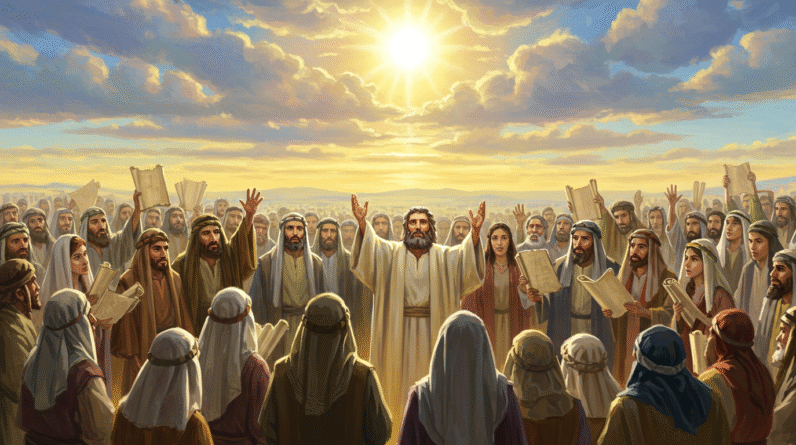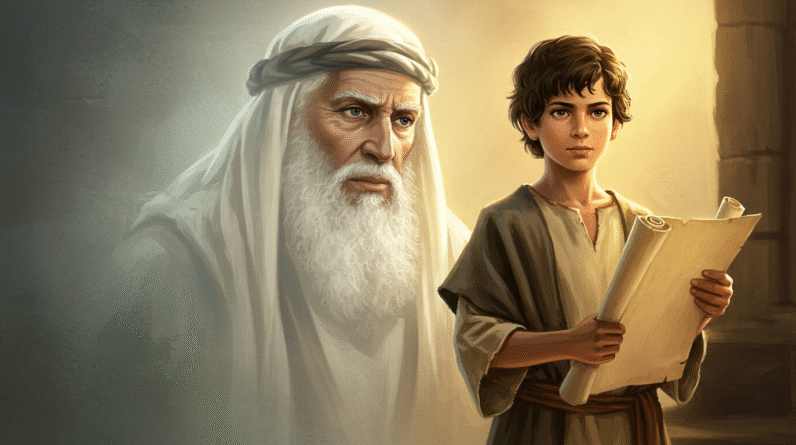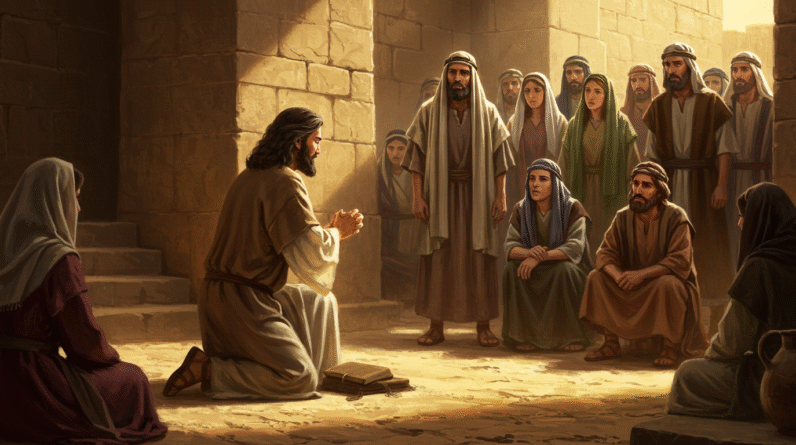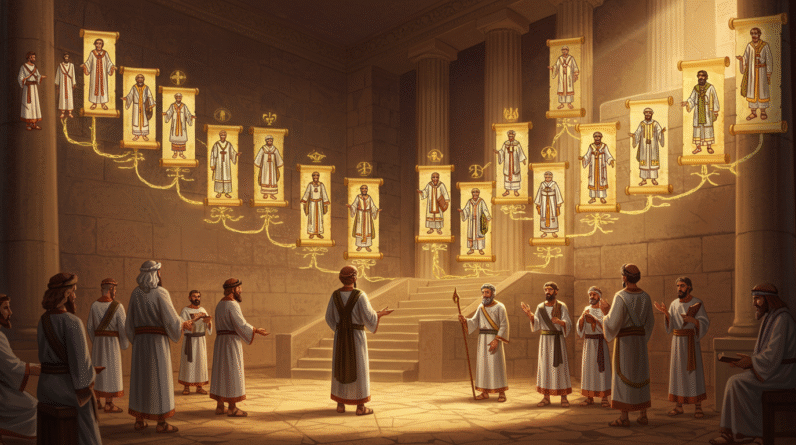Discover Ahimelech, the priest who aided David in ancient Israel, weaving loyalty and consequence in a tale that challenges our understanding of faith and history.
Ahimelech: The Priest Who Aided David – A Tale of Courage and Consequence
Picture yourself in Ancient Israel, amidst rolling hills and bustling towns, where faith and survival often intertwine into a complex dance of destiny. Here lies the tale of Ahimelech, a priest whose actions and decisions left an indelible mark on biblical history. His story resonates with timeless themes of loyalty, trust, and the moral complexities inherent in serving both God and man. Ahimelech’s narrative is not just an account of the past but a lesson that echoes through time, challenging us to ponder decisions, consequences, and the nature of divine service.

Who Was Ahimelech?
Ahimelech, son of Ahitub, emerges from the lineage of priests descended from Aaron, the brother of Moses, and is prominently featured in the Book of Samuel. As a high priest, Ahimelech served at Nob, a city of priests, which was a spiritual and religious hub for the Israelites at the time. It was here that Ahimelech’s life intersected with King David’s, as he provided aid to David during a pivotal moment of need. His story begins against the backdrop of King Saul’s reign, a period fraught with tension and unease, particularly as Saul became suspicious and envious of David’s rising favor among the people.
Ahimelech’s priestly duties primarily revolved around religious rituals and guidance, but true to the unpredictable nature of life, he was thrust into a situation that demanded far more than the typical priestly responsibilities. His decision to assist David, recorded in 1 Samuel 21:1, sets off a series of events that highlight his role as a key figure in one of the most dramatic episodes of the biblical narrative.
Key Moments in Ahimelech’s Life
Ahimelech’s encounter with David stands as one of the defining moments in his life. Fleeing from King Saul’s wrath, David arrived in Nob, seeking refuge and supplies. Despite David being well-known, Ahimelech was initially wary, as recorded in 1 Samuel 21:1, he questioned why David appeared alone. David deceived Ahimelech, claiming he was on a secret mission for the king. Trusting David, the priest provided him with consecrated bread, known as the Bread of Presence, and the sword of Goliath, actions implying a significant level of trust and respect toward David (1 Samuel 21:6-9).
A critical turning point arrived when Saul learned of Ahimelech’s assistance to David. Despite Ahimelech’s protest of innocence, stating he was unaware of David’s true status with Saul, the king’s paranoia left no room for mercy. In a tragic culmination, Saul ordered the mass murder of Ahimelech and the priests of Nob, an event documented in 1 Samuel 22:16-19. This brutal act not only marked Ahimelech’s end but also illustrated the high stakes and brutal politics intertwined with spiritual leadership during this tumultuous time.
Lessons We Can Learn from Ahimelech
Ahimelech’s story offers profound lessons on morality, faith, and the complexity of human choices. One of the key takeaways is the courage to act righteously, even when the consequences are perilous or uncertain. Ahimelech risked his safety to help someone in need, reflecting a profound commitment to hospitality and compassion. His experience teaches modern readers about the value of trust and integrity in leadership and service, even in the face of potential misinterpretations and dire outcomes.
Moreover, Ahimelech’s narrative challenges us to consider the consequences of our actions and the weight of our decisions. In today’s world, where quick judgments can easily lead to misunderstandings and conflict, Ahimelech’s story is a potent reminder of the importance of discernment, transparency, and truth. For Christians, his story underscores the importance of faithfulness to one’s values and the courage to make morally sound decisions, even when they lead to personal loss.
Biblical References & Context
Several passages within Scripture provide insight into Ahimelech’s life and actions:
- 1 Samuel 21:1-9: These verses detail David’s arrival at Nob and the provisions Ahimelech offered him.
- 1 Samuel 22:9-19: This passage outlines Saul’s wrath upon discovering Ahimelech’s assistance to David and the subsequent execution of Ahimelech and the priests at Nob.
- 1 Samuel 23:6: This brief mention confirms the son of Ahimelech, Abiathar, survived the massacre, providing a link to the continuation of Ahimelech’s priestly lineage.
These references not only document Ahimelech’s actions but also situate his story within the broader narrative of David’s rise and Saul’s decline, weaving a tale rich in drama and incidental heroism.
Ahimelech in the Bigger Picture
In the grand tapestry of the Old Testament, Ahimelech’s life illustrates the intricate interplay between divine plans and human actions. Despite his tragic end, Ahimelech’s role facilitated David’s survival, critical for the unfolding of biblical prophecy concerning the future king of Israel. His son, Abiathar, would later become an important ally to David, revealing how Ahimelech’s legacy continued to influence Israel’s spiritual and political journey.
While Ahimelech’s actions indirectly supported David’s path to kingship, there’s a reflective connection to the New Testament. Jesus, often referred to as the “Son of David” in genealogical terms, carried forth the themes of compassion and service exhibited by Ahimelech, underscoring the unity of God’s covenants through successive scriptures.

Final Thoughts
The story of Ahimelech, though short-lived, is replete with lessons and reflections for anyone seeking to understand fidelity, courage, and consequence in matters of faith and leadership. It prompts us to reflect on how our own choices echo into the lives of others, sometimes in ways we can hardly foresee. As you ponder Ahimelech’s legacy, consider how his narrative of encouragement and consideration under pressure can apply to your spiritual journey.
Acknowledgment: All Bible verses referenced in this article were accessed via Bible Gateway (or Bible Hub).







